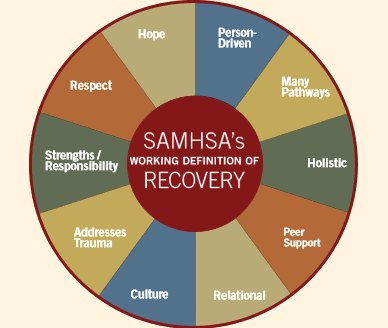“One of the principles of recovery is that there are multiple pathways to recovery. It involves health and wellness. It involves self-direction and that a person is making a choice.” — Carrie Breedlove, program coordinator for Recovery to Practice, University of North Texas, Department of Disability and Addiction Rehabilitation
Recovery to Practice (RTP), launched by the Substance Abuse and Mental Health Services Administration (SAMHSA) in 2013, infuses recovery principles into six behavioral health professions: psychology, psychiatry, nursing, social work, peer support and addiction counseling.
In 2015 the Hogg Foundation launched its own RTP grant program to disseminate the recovery curriculum throughout Texas. A key principle is ensuring that recovery is not just an idea, but a professional standard that informs how behavioral health professionals approach their work. Since then, six organizations have received funds totaling $1.7 million.
One grantee is the University of North Texas (UNT), Department of Disability and Addiction Rehabilitation. Program coordinator Carrie Breedlove, MS, LPC, joined us to discuss how to bring evidence-based recovery principles to the field of substance use.
The Practice of Recovery
 As a foundation we talk about RTP as “mainstreaming recovery-oriented principles throughout the healthcare system.” Breedlove says UNT’s program uses the SAMHSA definition of recovery. Core principles include:
As a foundation we talk about RTP as “mainstreaming recovery-oriented principles throughout the healthcare system.” Breedlove says UNT’s program uses the SAMHSA definition of recovery. Core principles include:
- Trauma-informed care
- Culture and diversity
- Peers and family
- Respect and hope
- Person-first
She points out that just as important is what is NOT part of the definition, such as abstinence, particular substances, drugs or alcohol, or any single approach.
One of the most important aspects is that there are many pathways to recovery. Typically people think of recovery as abstinence, the classic example being someone who has been through a treatment facility and is now free of drugs and alcohol. RTP can encompass this, but it is also open to newer approaches.
People are yearning for a wider range of options for the recovery process. Breedlove notes that RTP gives various pathways—smart recovery, refuge recovery, faith-based recovery, moderation management—a true offering of styles. If one particular pathway is not a great fit, there needs to be choices and options for the best chance of a positive outcome.
Creating Sustainable System Change
In the first year of the grant, UNT’s program delivered RTP training to 640 addiction and behavioral health professionals using the “train-the –trainer” model. UNT utilizes a nine-module curriculum based off of SAMHSA’s curriculum but built specifically for Texas communities. They’re also partnering with Texas Association of Addiction Professionals (TAAP), the state affiliate of the Association for Addiction Professionals (NAADAC), to conduct the trainings. TAAP serves as an important partner given their role in chemical dependency related work, legislative initiatives, continuing education, and networking opportunities.
In addition, UNT has created a virtual community of practice on Facebook that grew from 20 members to more than 700 members in less than one year. The group is yielding high engagement, doing live demos, sharing information and learning from other RTP professionals throughout the state.
UNT sees opportunities for sustainability through growth of the online community as well as fostering more connections with community colleges and universities across the state. They plan to provide a free, full 16-week semester course of the RTP curriculum to colleges with substance use and mental health related courses. As the curriculum is adopted into courses, the next generation of counselors coming through school will learn about RTP in the classroom.
And while there are systemic barriers to implementing RTP more widely (including time and money), Breedlove believes that having structural pieces in place will allow the momentum to continue as the current grant funding wraps up.
Another one of the six grantees to receive funding from the Hogg Foundation was the American Psychiatric Nurses Association (APNA) Texas Chapter. Read about how using the RTP curriculum, the APNA Texas Chapter is changing the way nurses and other providers care for patients with mental health issues. Learn more about the Hogg Foundation’s commitment to RTP.
Learn more about our podcast and check out other episodes!
